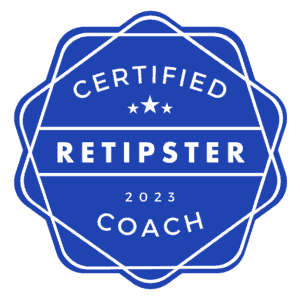For years, people have asked me to coach them on various aspects of real estate investing.
It's always great to hear from people who think I'm qualified to help them, but I learned years ago that, for several reasons, coaching isn't the best use of my time.
It's why I created REtipster.com, which gave me a way to help many more people in a much more scalable way.
I'm just one guy, after all, and my time is limited. I could either spend a few hours helping one person solve most of their problems or a few hours helping hundreds of people solve one problem at a time. I chose the latter.
Even though I chose not to spend my time coaching people one-on-one, I have to admit coaching certainly has its place. There's no substitute for getting one-on-one help from a qualified individual who can address your specific deal or situation.
But how do you know when someone is “qualified” in the first place? After all, most coaches and consultants will position themselves to look as good as possible because they want your business. So how can you know when you've got the real deal?
Here are some questions that can help inform you about who you're working with.
Background Questions
What is your background as a real estate investor? How long have you been a real estate investor, and how long have you been a coach?
If you're looking seriously at a coach, you probably already have a decent idea of why they're qualified to help you. Even so, you may learn something new by asking this question that either confirms or denies their viability as a coach.
Why did you decide to get into coaching?
There are many possible answers to this question, and none are good or bad, right or wrong. This question will add color to your understanding of who a coach is and why they do what they do.
Are you still actively doing what you're teaching or teaching something you used to do?
The average person may not realize this, but “coaching” is an entirely different business than real estate investing. There may be some overlap, but most of time spent coaching is time they don't spend doing deals of their own.
This isn't a disqualifier, but it's still a good question to make sure you understand how actively involved they are in what they're teaching.
Expertise Questions
Can you provide any references or testimonials from your past clients?
Find out what results this coach's past clients have achieved.
Also, remember that most successful real estate coaches are masters at self-promotion. If they don't know how to sell their services and make themselves sound good, they won't make it very far as a coach. Every professional educator I know (even the bad ones) can come up with testimonials and positive reviews… do be careful not to be sold on this single question.
It's always worth asking for these, but also realize this is one of many different things you'll want to consider when hiring a coach.
Do you have any specific areas of focus, expertise, or sub-niches you teach about?
Some coaches focus on one particular thing (deeper than wide), while others have a broad list of things they can help you with (wider than deep). Sometimes, a coach may have specific areas of expertise you aren't even aware of yet!
This question will help you understand who you're dealing with and what they can do for you.
In your opinion, what are you NOT qualified to help me with?
This is an essential question because any honest person should be able to tell you at least a handful of things they are NOT an expert in. You're looking for an honest assessment of where they fit into your plans and goals (if they fit at all). A good, successful coach shouldn't need your business to survive another day; they should have plenty of clients lining up to work with them.
So if you find them saying “Yes! Yes! Yes” to everything without any admission of where they aren't the best, it's time to pause and reflect.
Setting Expectations
What is your coaching style?
Working with someone whose coaching style aligns with your learning style and goals is important. Even if a coach comes highly recommended by someone you trust, make sure that coach fits your style too, not just the person who recommended them.
What is the scope of your coaching services?
Even the best coaches aren't experts at everything. And there are limits to how much help they're willing and able to provide.
Before you get into a coaching relationship, make sure you understand their areas of expertise and how far they can carry you before you need to hit the ground running.
Can you provide a clear plan or outline of what our work together would look like?
Every coach has a different style in how they teach. Some will take you through a structured curriculum, and some will have ongoing, free-flowing conversations with their clients with little structure. Whatever the case, you'll want to understand what you'll get after you start working with them.
How much access will I have to you? How often will I have it? How quickly should I expect responses from you?
Some coaches communicate with a single medium like email. Other coaches will communicate via phone, Zoom, Slack, email, and Facebook Messenger. Some coaches will give you unlimited access to them. Others will provide you with one hour every two weeks, and that's it.
Whatever the case, get clear about how much access you'll have to your coach or their team.
Who will I be working with as my coach?
It's essential to understand who your actual coach will be. Will you be working with the face of the organization or one of their hired coaches (usually, a former student whom they pay a small portion of your coaching fee while they pocket the rest of the cash)?
What will I be responsible for in achieving my goals?
In the end, you are responsible for your own success. But even so, if you're paying a coach, they should also play an essential role in that journey. The key is to understand where their work stops, where your work starts, and how much your responsibilities overlap. Understanding this upfront will help avoid frustration if the coach doesn't do what you expected.
What will you be responsible for in achieving my goals?
Some coaches use the “Socratic” teaching method by asking well-pointed questions and engaging in dialogue rather than simply giving you a lecture. Other coaches will spell everything out for you, tell you precisely what to do, and then you have to do it. Other coaches will literally do some of the work for you!
However a prospective coach works, this is your chance to understand what role they might play in the business relationship.
What other costs will I need to pay outside of your coaching fee?
Make no mistake—the cost of a coach is only the beginning. Ensure you understand ALL the costs you'll have to cover to reach your goals and objectives. That includes software, services, other educational materials, and anything else it will take to cross the finish line. You don't want to start something if you don't have the resources to finish it!
How much of my time will be required to reach my goals?
Similar to the money issue, any realistic success plan will probably require a sizeable amount of your time. This is an excellent opportunity to get their best estimate for how much time you should plan to dedicate to reaching your goals.
How will we set goals and track my progress?
There isn't much of a point in having goals if you don't know when you've achieved them. Having a clear plan for how you will work towards your goals and measure progress is essential.
Can you provide any ongoing support or resources after completing our work?
What does the long-term relationship look like? Will there be a long-term relationship at all? Whatever the case, this is the time to understand when and how the relationship ends.
What is your cancellation and refund policy?
I don't know many coaches who offer refunds on their services because coaching is a time-intensive task, and a good coach's input is precious. Even so, if you get cold feet or aren't happy with what you get, you'll want to know your options if you decide the coaching relationship isn't a good fit.
Keep in mind it's not fair to expect perfect answers to all of these questions.
Every coach has limits, whether it's their time, knowledge, or availability.
These questions aim to inform you and set your expectations about what a coach can offer. If you don't like what you hear on these questions, then they probably aren't the right coach for you.
Vetting a coach is part of why we came up with REtipster Certified Coaches, so I could send people like this to other qualified experts in the business of providing this kind of help.
REtipster Certified Coaches
Are you looking for a coach to help in your land investing business? A decent coach can be hard to find. That’s why we’ve compiled a list of some experienced, trustworthy, reliable coaches that we trust.
REtipster Certified Coaches are dues-paying members who have been vetted and have agreed to abide by the highest ethical standards and code of conduct.
These coaches are independent contractors. REtipster does not employ them, and we do not dictate their pricing or the specifics of what they teach. We encourage you to evaluate them and make your determination about their suitability for your needs. Ask them some of the questions above and see if they're the right fit for you!





















